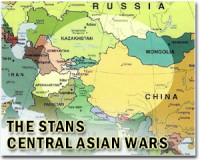| . |  |
. |
Beijing (AFP) May 17, 2011 Pakistan Prime Minister Yousuf Raza Gilani begins an official visit to China on Tuesday with the US killing of Osama bin Laden expected to push Islamabad to seek closer ties with Beijing. Gilani's four-day visit comes in the wake of the US operation to kill the terrorist mastermind on Pakistani soil, which has raised questions over the stability of US-Pakistan relations. Gilani will speak at a cultural forum in the eastern city of Suzhou on Tuesday before travelling a day later to Beijing, where he will meet with President Hu Jintao and Premier Wen Jiabao. China is the main arms supplier to Pakistan, which sees Beijing as an important counter-balance to Pakistan's traditional rival India. India has recently tightened its ties with the United States, causing worry in Islamabad. US special forces killed bin Laden at a compound near the country's top military academy on May 2, sparking speculation that Islamabad may have known about his whereabouts, as well as criticism over the impunity of the raid. China has shown unswerving support for Pakistan since the episode, and Gilani is expected to seek a reaffirmation of Islamabad's "all-weather" friendship with Beijing. In an address to parliament last week, he warned that Pakistan reserved the right to retaliate against any similar such US raid in future, while praising China as a "source of inspiration". Facing weak Western investment in its moribund economy and crippling power shortages, Pakistan is looking for closer trade and energy ties with China. Pakistan last week opened a 330-megawatt nuclear power plant in central Punjab province with Chinese help and said Beijing had been contracted to construct two more reactors. The plans have triggered US concern over the safety of nuclear materials in the unstable, violence-plagued country where Muslim militancy is strong. However, Andrew Small, an expert on China-Pakistan relations at the German Marshall Fund in the United States, said that despite its public statements, China has historically not offered significant economic support to Pakistan and has avoided stepping in between Islamabad and New Delhi. "China is more comfortable now geopolitically in taking rhetorical positions and it has more money to put in, but they're not going to want to be in a position where they end up with Pakistan on their plate to deal with," he said.
Share This Article With Planet Earth
Related Links News From Across The Stans
 Afghan bomb blast kills four NATO soldiers
Afghan bomb blast kills four NATO soldiersKabul (AFP) May 16, 2011 Four NATO soldiers were killed Monday in a bomb attack in southern Afghanistan, one of the toughest battlegrounds in a nearly 10-year Taliban insurgency, the alliance said in a statement. The US-led International Security Assistance Force (ISAF), NATO's mission in the war-torn country, did not provide the nationalities of the casualties, leaving it to their native countries to do so. "Fo ... read more |
|
| The content herein, unless otherwise known to be public domain, are Copyright 1995-2010 - SpaceDaily. AFP and UPI Wire Stories are copyright Agence France-Presse and United Press International. ESA Portal Reports are copyright European Space Agency. All NASA sourced material is public domain. Additional copyrights may apply in whole or part to other bona fide parties. Advertising does not imply endorsement,agreement or approval of any opinions, statements or information provided by SpaceDaily on any Web page published or hosted by SpaceDaily. Privacy Statement |